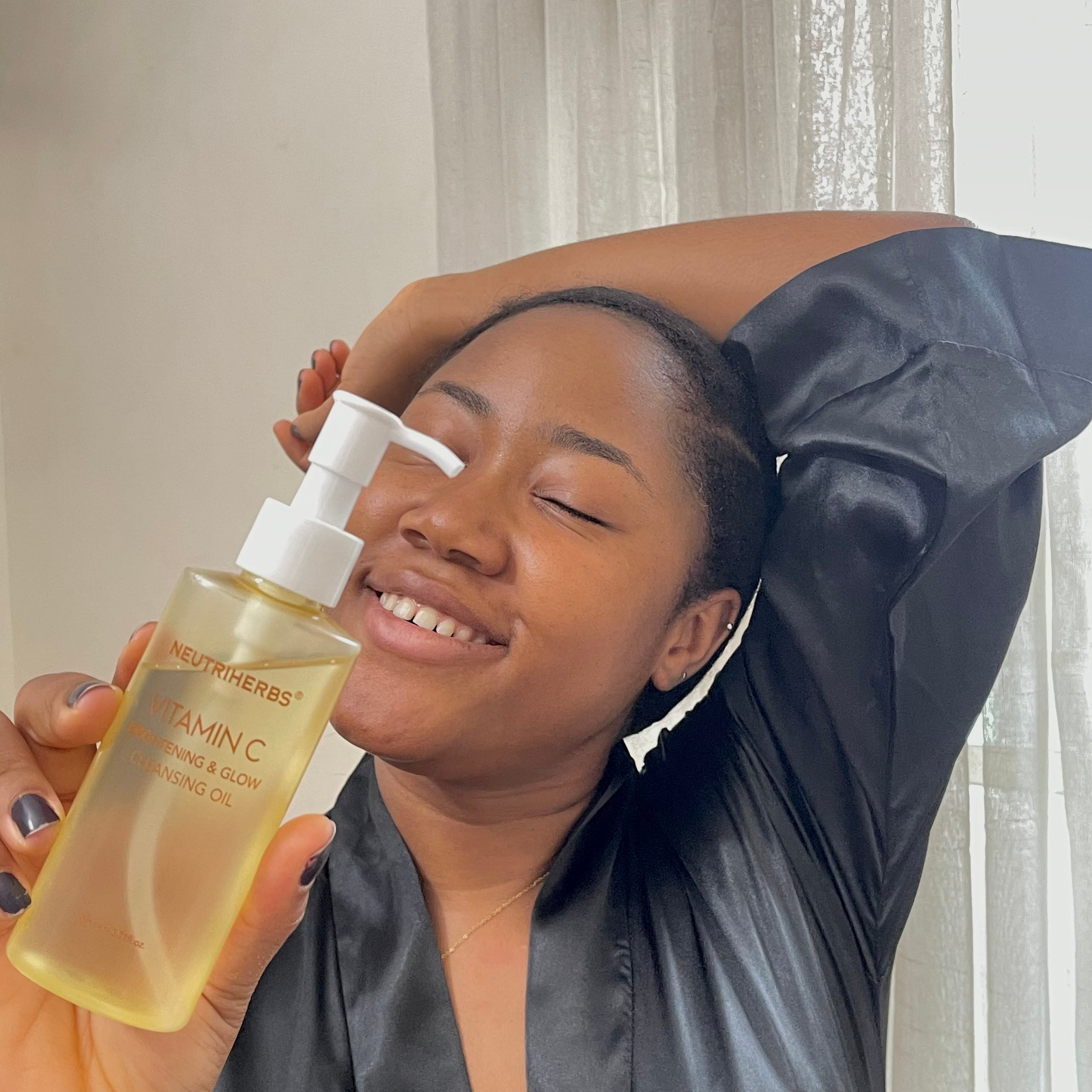Want clean, soft-as-baby skin? Then you absolutely need to incorporate a cleansing oil into your skincare routine.
After your first use of an oil-based cleanser to remove makeup, odds are you might never go back.
The best cleansing oils do more than just melt off every trace of your waterproof mascara or eyeliner; depending on formulation, they can also help hydrate, smooth skin, and even deep-cleanse your pores.
All of this is to say that you definitely need a cleansing oil in your lineup, which is why we put up this article to tell you everything you need to know about them.
What Is a Cleansing Oil?
Cleansing oils are a specific category of cleanser made with a blend of plant-based oils such as olive, jojoba, castor or sunflower.
These oils have emollient properties that help soften and nourish the skin which makes them part makeup remover, part face wash, designed to do the heavy lifting of breaking down sunscreen, waterproof makeup, grime, and debris without leaving behind much oil residue.
Unlike traditional cleansers that can strip the skin of its natural oils, Cleansing oils call on water-soluble oils to gently dissolve a day’s worth of makeup, oil, and grime without irritating your skin or stripping it dry. It leaves your face nice and ready (kinda like a soft, dewy little canvas) for the rest of your products, and every skin type can benefit from one (even you oily or acne-prone skin!).
The Science Behind Cleansing Oils
At this point, you may be wondering how can oil be used to clean up oil? Though oil and water typically don't mix, that's not true in the case of oil cleansers - like attracts like, oil dissolves oil.
But that’s not all it takes.
Oil cleansing formulas are designed to “emulsify" (Emulsifiers are additives that help mix oil and water, leading to a product that can more easily be rinsed off with water) when they come into contact with water, meaning that the two compounds are forced to stick together and transform into a milky liquid that transports all the dirt and grime off your face.
How Cleansing Oil Benefits Your Skincare
A good cleansing oil kicks off your skincare routine by washing the slate off your skin. But the benefits of oil cleansing don’t stop there. Oil cleansers also:
- Promotes Smooth skin:
As cleansing oils don’t open your pores or require harsh scraping, using them can leave your skin feeling particularly smooth, silky and supple.
- Moisturize and support skin barrier health
Oils are good for moisturizing the skin, but not hydrating it. And there’s a big difference. While oils don’t add water content to the skin, they are very effective at “conditioning” skin by trapping water —shoring up your skin barrier from water loss.
- Nourishes skin
Because lipophobic cleansing oils can sink deep into the top layers of the skin, they’re often shown to produce skincare benefits that are more than skin deep.
- Work For Every Skin Type
There’s a common misconception that oil-based cleansers are better suited for dry skin and that water-based cleansers like gels are the only way to treat oily or acne-prone skin. The truth is both simpler and more complex. The truth is that oil can work for any skin type—you just need to know what to use. But rest assured: There’s a cleansing oil for every face, including yours.
- Fast and easy way to remove makeup and SPF products.
- Leave skin feeling smooth and soft.
- Can be used alongside other cleansers if you want to double cleanse.
Who Is a Cleansing Oil Best For?
A well formulated cleansing oil that can be rinsed with water and leaves no residue is suitable for all skin types.
Whether or not you should use a cleansing oil comes down to your choice and how much of a makeup person you are. If you use a good cleansing oil you won’t need a separate makeup remover which saves you time.
If you’re a sunscreen faithful, Our pro tip is to use a cleansing oil, especially since a lot of mineral sunscreen formulations are water-resistant.
While oil-based cleansers—or any cleansers, for that matter—don't stay on your face for too long, most are infused with moisturizing ingredients, like jojoba seed oil, apricot kernel oil, and centella asiatica extract, which actively nourish skin while giving it a deep clean. If you have sensitive skin, just check the label's ingredients list to ensure the formula doesn't contain any irritants like synthetic fragrances and contains hydrating ingredients.
How To Use Cleansing Oil Properly

1. Apply product
Start by getting out a pump of cleansing oil into clean hands, and apply it to dry skin.
2. Massage
Gently massage the oil into your skin using circular motions. This will create friction that heats up both your skin and the product, opening your pores to allow for better absorption of the oil.
3. Rinse
Use warm water and a damp washcloth to remove the cleansing oil and any impurities it's picked up from your skin. It's important to make sure your cleansing oil is totally rinsed off before moving on to the rest of your routine, as leaving any on your skin can clog your pores (and cause breakouts) and prevent your other products from permeating into your skin.
4. Cleanse (optional)
Make the most out of your second cleanse by using something active, like an exfoliant, or keep it simple with a standard water-based face wash. With this step, too, you'll want to lather and rinse completely.
cleansing oil will not replace your standard face wash because "it is just an extra step to remove more particles than a standard cleanser alone.
In fact, because they essentially act as a makeup remover, use a cleansing oil once per day, particularly at night, especially if you wear makeup.
A quick cleansing tip: Make sure you work your cleansing oil onto dry skin, so it breaks down waterproof makeup, sunscreen, and dirt, before rinsing off with lukewarm water or gently wiping it away with a soft wash cloth.
Common Cleansing Oil Mistakes
1. Applying it to Wet Skin
The biggest mistake we see people making is mixing cleansing oil with water before it's been rubbed into the skin. Your goal is to allow the oil to blend with the natural oils, dirt, and makeup on your face, and since water and oil repel each other, introducing water will only interfere with the process and prevent the product from effectively cleaning the dirt and oils off your skin.
2. Using cold water
When it comes to effectively removing cleansing oil, the temperature of the water you use plays an important role.
The colder the water, the more likely the oil will firm towards solid state, and render it ineffective.
Warmer temperatures ensure the oil stays in a liquid state, and combine more effectively with the oils and dirt on our skin." The key here is "warm"—not "hot"—because hot water will strip your skin barrier and negate some of the nourishing elements of the oil cleanser.
3. Not rinsing entirely
Unlike facial oils, which serve as a final hydrating step after your moisturizer and are meant to stay on your skin all day, cleansing oils need to be completely removed. Otherwise, they can cause breakouts and can prevent your other products from working properly.
4. Using too much cleansing oil
using too much cleansing oil, makes it difficult to remove. And again, any remnant oil that’s left on the skin can clog the pores and cause unwanted breakouts. A little bit of cleansing oil goes a long way.
5. Not double cleansing
If you do experience breakouts after using cleansing oil, it’s likely because you’re not rinsing or wiping the oil off your face entirely. This is why we suggests double cleansing.
Make sure to apply the cleansing oil first and use another gentle cleanser to remove it preferably with a soft cleansing cloth or washcloth.
Once you’ve implemented the double cleansing method and you’re still having breakouts, it could be because you’re using a pore-clogging cleansing oil.
6. Oil cleansing too often
In the case of oil cleansers, it is possible to have too much of a good thing. If you oil cleanse too frequently, you'll pull too much of the skin's natural sebum away, leaving your sebaceous glands in a state of panic—they'll feel like they need to create more sebum, So how often should you oil cleanse? Experts recommend implementing the step once a week to see how it responds, then work your way up to using it every day. If you find your skin starting to feel dry, consider cutting back your usage.
7. Not choosing the right cleansing oil
Not all oils are suitable for cleansing. Some oils are inherently more comedogenic, [meaning] blackhead and whitehead forming, than others. Learn more about comedogenic oils.
How Do I Choose A Cleansing Oil?
Now you’re curious about adding a cleansing oil to your routine —which one is right for you? Slide down as we walk you through 3 vital things to consider when choosing:

Surfactants:
some of the best Oil cleansers are mainly composed of surfactants—ingredients that help to remove dirt and grime—and base oils. How surfactants are blended with plant based oils can impact rinsability and cleansing power of a cleansing oil.
Surfactants are kinda of a must because they are the ingredients that help whisk all those oils away so they’re not left behind on your skin.
A few common surfactants to look for include caprylic/capric triglyceride, polyglyceryl-4 oleate, and sorbitan sesquioleate (among many, many others).
New Neutriherbs Vitamin C Cleansing Oil Makes use of caprylic/capric triglyceride - a non-sensitizing, gentle cleanser for skin, facial and hair products. It's a great secondary liquid surfactant in cleansing oils as it adds good foam quality and a silky after-feel.
If your cleansing oil doesn’t contain a surfactant, it’s key to double cleanse, following your cleansing oil step with the use of a water-based cleanser.
Plant-Based Oils:
Sounds obvious, but when shopping for a cleansing oil, you want to make sure that oils hold the starring role in the formula; As in they should be in the beginning of the product’s ingredient lists. Then, look for specific oils. We recommend jojoba or argan oils for those with oily or acne-prone skin, as they can help regulate your skin’s oil production without clogging pores. (Squalane also falls into this category.)
Richer complexions can tolerate heavier oils like olive oil or castor oil; if you have sensitive skin, skip out on castor oil, It has antibacterial properties and acts like an astringent, which will dry the skin,” he explains.
Not all oils are good for your skin, however. The most important rule when looking for an oil cleanser is to avoid comedogenic oils - Cocoa butter, coconut oil, and avocado oil are the biggest offenders here.
Fragrance-Free Formulas:
Unless you have very sensitive skin or battle skin conditions like eczema, fragrance isn’t necessarily a bad thing for most skin types, and it can boost the cleansing experience. If you have reacted negatively to fragrance, then by all means, don’t use a product with added fragrance.
However, just because a formula doesn’t mention “fragrance” on its ingredient list doesn’t mean it’ll be unscented. Fragrance is different from essential oils. While some essential oils can be sensitizing, especially if your skin is irritating, they can also be a luxurious touch.
New Neutriherbs Vitamin C Cleansing Oil is fragrance-free and color-free. It does not have added flavors or colors, providing a pure and gentle cleansing experience.
For All Skin Type: The Neutriherbs Vitamin C Brighten & Glow Cleansing Oil
Neutriherbs “gentle yet effective” Vitamin C Cleansing Oil formula for all skin types including sensitive and acne-prone skin. It’s formulated with a blend of jojoba and sunflower seed oils which help dissolve makeup and impurities without causing breakouts due to their noncomedogenic properties.
It’s also made with ingredients with proven antioxidant benefits, such as Licorics root extract to help leave skin feeling refreshed and balanced.
Thanks to the inclusion of vitamin C (in the form of ascorbyl Tetraisopalmitate), this cleansing oil provides a slight brightening, tone-evening boost to the skin while also melting away the day's grime, sunscreen and makeup.
Frequently Asked Questions
How does it differ from other cleansers on the market?
Time for a science lesson: Traditional cleansers use surfactants, such as soap, to remove dirt and excess oil from the skin. These surfactant-based water cleansers work better on water-soluble particles. Some cleansing oils also contain surfactants, but the main cleansing component is the oil itself. Oil cleansers tend to foam significantly less than regular face washes due to minimal surfactants.
What ingredients and textures to look out for
The texture of cleansing oils can vary. Some are lightweight and easily spreadable, while others are thicker and heavier and may require more effort to rinse off.
Fragrance-free options are ideal, as fragrances can be potentially irritating, especially for sensitive and dry skin types. Try to look for a formulation with relatively few ingredients; less ingredients generally mean there are fewer potential irritants. Also, look out for hydrating superstars like glycerin, niacinamide, and colloidal oatmeal that help nourish skin’st moisture barrier.
Do you have to follow a cleansing oil with a gel or foam cleanser?
Contrary to what most people think, you don’t always need to follow an oil cleanser with a gel or foam—it depends on your skin type and condition. Double cleansing—using a water-based cleanser after an oil cleanser—is often recommended for those with oily or acne-prone skin to ensure all impurities are thoroughly removed. For dry or sensitive skin, a single oil cleanse may be sufficient, as it effectively removes dirt and makeup without stripping the skin.
Can oily or acne-prone skin still use a cleansing oil?
Yes, cleansing oils are products that every skin type, even oily and acne-prone skin, can benefit from.
Do oil cleansers clog pores?
No, your oil cleanser won’t clog your pores if you choose a noncomedogenic formula. Oil cleansers may clog pores if comedogenic oils are used. If prone to acne, it is important to choose oil cleansers that are noncomedogenic, such as jojoba oil or argan oil.
Consult our our article below for expert-approved non-comedogenic oils that won’t clog your pores. Along with jojoba and argan oils, formulas with pore-friendly plant oils like grapeseed, rosehip, and sunflower oils, as well as squalane, for acne-prone skin.







Comment
Thank You for this advise please how can I get this product?